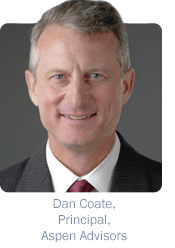 It's a perfect storm of challenges in the healthcare space today. New technologies, new federal mandates and an aging Baby Boomer population is forcing the industry to evaluate how they deliver care to their patients from the ground-up. Technology is a major theme in this transformation. What once was the provenance of back-office wonks is now front-and-center in physicians and hospital administrators' daily lives. Aspen Advisors' Principal Dan Coate shed some light on what clients are facing, and how they're helping them navigate these choppy waters.
It's a perfect storm of challenges in the healthcare space today. New technologies, new federal mandates and an aging Baby Boomer population is forcing the industry to evaluate how they deliver care to their patients from the ground-up. Technology is a major theme in this transformation. What once was the provenance of back-office wonks is now front-and-center in physicians and hospital administrators' daily lives. Aspen Advisors' Principal Dan Coate shed some light on what clients are facing, and how they're helping them navigate these choppy waters.
Consulting: What are some of the biggest challenges healthcare providers are facing?
Coate: What we find with our hospital clients is they're all looking at the impending Affordable Care Act legislation, particularly some of the elements that are going to be enacted late in 2013-2014 all around cuts in reimbursement as well as health plans coming up with exchanges for the uninsured to sign up for insurance. What we're also seeing in the legislation is an act called Meaningful Use, which incents providers to implement electronic health record technology. Right now we are in the carrot of that act, which means health providers are given money for meaningful use of electronic technologies. In a couple years we'll shift to the stick, where they will start receiving penalties on their Medicare dollars if they're not using the technology. That's driving a lot of our business. Finally I would say there is a shift in coding standards from ICD-9 to ICD-10, the International Classification of Diseases, it's a whole new coding standard that hospitals and health plans must comply to by October 2014, which means major overhauls of not only their technologies but also the education to physicians and other providers as well as their overall processes. The role we play while everything we do is technology-oriented, we largely focus on the people and the processes required to make those technologies successful. In the advisory place where we play, it's helping them look not only at technology solutions, but particularly how are those solutions going to be used, what will be the impact on the workflow, the people and therefore what types of leadership change management that's required to help get their staff from Point A to Point B.
To continue reading, become an ALM digital reader
Benefits include:
- Authoritative and broad coverage of the business of consulting
- Industry-leading awards programs like Best Firms to Work For, Global Leades and Rising Stars
- An informative newsletter that goes into the trends shaping the industry
- Critical coverage of the employee benefits and financial advisory markets on our other ALM sites, BenefitsPRO and ThinkAdvisor
Already have an account? Sign In Now

